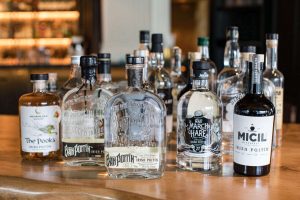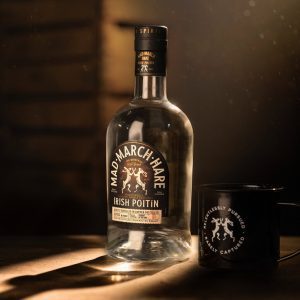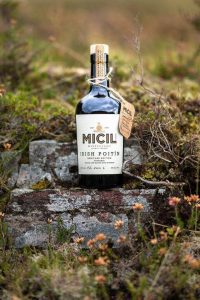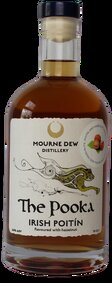Poitín – a step into history, an order out of the ordinary?

Poitín’s resurgence as an ideal white spirit for use as a cocktail base behind and in front of the bar has seen its popularity grow on both sides of the counter. The spirit now seems to be getting a global embrace from various cocktail bars.
London’s Sun Tavern could be described as the flagship for Poitín in the UK’s capital. And for a long time Poitín was bigger in London than it was in Ireland where it was a regular constituent of cocktails in the Savoy Hotel there. Ireland may have been a bit slower to catch onto the trend but Poitín has also made inroads in the US, with tastings having taken place in San Francisco and New York where they love the ‘Irishness’ of it, the story of it and its history.
First off, let’s kill the myth: Potín was not originally distilled from potatoes. That was the ‘modern’ way. Potatoes were only used in the last couple of hundred years. Originally – and today – PoitIn was made from grain. So it’s more of a white whiskey where traditional whiskey would continue its ageing journey in wood.
Poitín goes legit
Back in the day the whiskey-distiller was really not the friend of the Poitín-maker. One was considered a “British parliament spirit” while the other was regarded as the “real drink” of the Irish people, distilled as it was in the hills and hidey-holes of the Irish countryside.
A lot of people think Poitín is still illegal but it’s been legal in Ireland since 1997 and exported since 1987.
Poitín sales
Latest ibec figures on Poitín volumes show that following a rise in volumes in 2016 to 5,500 six-bottle cases, 2017 saw this rise 5.5% further to 5,800.
The following year saw a drop, however, to 3,800 six-bottle cases after which a slight rise of 1.5% took place in 2018 to 3,890 according to estimates from Drinks Ireland|Spirits.
However 2019 saw volumes decrease 3.6% to 3,750 six-bottle cases.
“The drop in size between 2017 and 2018 can be ascribed to a distillery who was producing Poitín stopping doing so,” Vincent McGovern, Head of Drinks Ireland|Spirits, told Drinks Industry Ireland, “And a smaller drop/levelling out can likely be ascribed to another brand owner refocusing his attention away from promoting the category.”
But Drinks Ireland|Spirits has a number of members who’re considering producing Poitín in due course, he added, so that curve is likely to bend upwards again in years to come.
Mixologists – particularly those requiring a white spirit base – might take a closer look at the attractions of Poitín as a base ingredient.
After all, it’s a relatively new and untapped product with a rich history and authenticity.
It’s a spirit that hasn’t been widely utlised outside a small but growing number of cocktail bars around the country, a chance for bartenders to get in ‘at the ground floor’ as it were.
And with the trend towards local, it’s always made by smaller producers so there’s really nothing more local than Poitín. Fortunately, it lends itself really well to cocktail-making.
Unlike gin, a botanical that begins with a natural grain before the botanical flavours are added, or vodka – which by nature is clean and clear, odourless and flavourless – Poitín is all about keeping the flavour in.
Thus it’s been ordered in such formats as a ‘Bán & Black’ (Guinness with a side-shot of Poitín) or a Belfast Coffee, a cold-brewed Irish Coffee using Poitín instead of whiskey.
Although drinking it as a shot is much less common (it being happier as a cocktail ingredient) bartenders have often enjoyed a straight shot of Poitín themselves but it may not yet be out there for the masses, agreed one mixologist.
Mad March Hare’s new bottle design

Mad March Hare, the award-winning Irish Poitín from Intrepid Spirits, has unveiled a new bottle design embracing the resilience and Celtic character of the Irish hare. This iconic but endangered native has inhabited the Irish countryside since the last ice age, adapting and fighting to survive. Much like Poitín-makers themselves, they’ve been relentlessly pursued but rarely captured.
Triple-distilled in small copper pot stills in West Cork using only the finest, locally-sourced malted barley Mad March Hare is bottled at 40%, resulting in a drink that’s full of character and exceptionally smooth.
Launched in 2014, Mad March Hare, was the last winner of Best Irish Poitín at the Irish Whiskey Awards in 2019, as well as Gold Medal winner at the SIP Awards 2018 and Double Gold at the San Francisco World Spirits Competition in 2016. It’s now the #one Poitín brand in the US.
Bar1661 has been developing the world’s first Poitín RTD in collaboration with Mad March Hare and Bán Poitín, due to launch soon.
In celebration of its new bottle design, Mad March Hare Poitín has teamed up with Poachers premium Irish mixers and Off the Cuffe bitters, two Irish brands also committed to local native ingredients, to launch the Ultimate Irish Mule Kit, available exclusively from Irish Drinks Shop this Summer.
Ultimate Irish Mule Recipe
1 part Mad March Hare Poitín
3 parts Poachers Ginger Beer with Irish chili
2 dashes of Off the Cuffe Aromatic Hedgerow bitters
Squeeze of fresh lime
A mug of ice
Mad March Hare is distributed by Intrepid Spirits through Celtic Whiskey Shop, Classic Drinks and MCM Spirits. For more information, visit madmarchharepoitin.com or follow @madmarchharepoitin on Instagram.
Mad March Hare – Q&As with John Ralph, Chief Executive of Intrepid Spirits

How are sales of Mad March Hare standing up to Lockdown?
Surprisingly, sales of Mad March Hare have increased significantly through the Lockdown. A lot of this is down to the shift to e-commerce where we’ve been able to speak directly to the consumer, harness the awareness of Poitín as a category and tell our brand story more effectively. We’re an on-premise first company and will always be, but this has really shown us the power of online for telling our story and engaging consumers. This will really benefit the on-premise once it opens fully as we can then send our customers to bars that are serving great Mad March Hare drinks.
How do you market Poitín to the consumer?
This varies by market; in Ireland and to some extent in the US, there’s a latent awareness of Poitín. There was always some member of the family that used to have a bottle stashed in the drinks cabinet but it was always considered “dangerous”. Whilst this awareness is useful in starting the conversation with a consumer, we try to move the discussion to how Poitín is the original craft spirit, older than any other spirit category out there and was always made with a certain skill and flair. Consumers are hungry for brands and categories with real heritage and craft credentials, from there we let the liquid do the talking.
What’s the best thing about Mad March Hare in a cocktail?
Mad March Hare has a very unique flavour profile that holds together really well in a cocktail whether that’s in a Mad March Mule or even citrus-based cocktails like a Margarita. However, if you really want to appreciate the flavour of Mad March Hare, it tastes great neat or even as a chilled shot!
To what extent has the slowdown in sales dented the revival of Poitín?
Honestly, I believe that this has been a blessing in disguise for Poitín. We’ve spent five years in the US building Mad March Hare bar by bar, bartender by bartender, the classic way to build brands and new categories. The Lockdowns forced us to rethink our approach and we pivoted to a dedicated brand e-commerce store supported with investment into social media advertising. The results exceeded any of our expectations. We sold more in 90 days than we had sold in the previous five years! We understand now, after engaging in conversations with our fans, that a lot of people were aware of Poitín but didn’t quite understand the category and more importantly couldn’t find a retailer to purchase from. This is a great lesson for any craft spirits brand in leveraging the long tail of e-commerce.
What are your plans to further promote exports of Mad March Hare?
Intrepid is a truly global business with operations in Dublin, Los Angeles, Tokyo, Shanghai, La Paz and Sydney. Whilst the infrastructure was initially built to support the expansion of Cocalero we’re now well-positioned to leverage this infrastructure to take Mad March Hare and the rest of our portfolio to the world.
Micil

In 1848 Micil Mac Chearra began distilling Poitín on a Connemara hillside. His family have been crafting exceptional Irish spirits on the shores of Galway Bay ever since and so represents Ireland’s longest unbroken family distilling tradition. Founded and run by Micil’s direct descendants, Micil Distillery still produces remarkable Poitín as well as an award-winning Irish gin.
And it recently began laying down Galway’s first legal whiskey in over 100 years.
Connemara Poitín is traditionally made using nothing but grain, water and yeast.
It shares a very similar mash bill to whiskey. In fact before cask-aging was introduced, Poitín and whiskey were essentially the same spirit, separated only by the buying of a licence.
Both were known as fuisce in the Irish language, still spoken in South Connemara where the Micil story began.
Micil Irish Poitín is a fruity spicy Poitín distilled using 100% Irish malted barley and Connemara bogbean. It’s the stand-alone leader in the Irish Poitín category.
Bottled at 44% ABV it’s an incredibly versatile spirit which works exceptionally well in both cocktails and highball serves, delivering a wonderful depth of sweetness, flavour and spiciness that no other Poitín can match.
Try it in a Poitín Sour, a Poitín Paloma, or a Micil Mule.
Micil Heritage Poitín is a spicy, smoky, full-flavoured Poitín produced using malted barley & oats, peated using turf from the Micil family land in Connemara. This unique Irish spirit is made to an original family recipe and was the first modern peated spirit made in Ireland using 100% Irish grain and 100% Irish peat.
Wonderful served neat, the rounded & characterful liquid is also worth experimenting with – try it in a highball with fresh Lemon juice, honey & Ginger syrup topped with soda.
Check out www.micildistillery.com for more info.
Mourne Dew

Multi-award winning Mourne Dew Distillery is based in Warrenpoint in the foothills of the Mourne Mountains. It currently offers two different Poitíns.
Its Blend No 1 won the Gold Medal at the Blas na hEireann Irish Food Awards in 2019 for best clear spirit produced on the Island of Ireland whilst its other Poitín is a hazelnut Poitín liqueur made with a blend of pot still and grain liquors infused with hazelnuts.
Mourne Dew started distilling in 2017 and now produces a wide range of spirits.
As well as using conventional distillation techniques it has invested heavily in cold distillation research and processes and produces its Poitíns from stills operating at 2% of atmospheric pressure.
“Vacuum distillation is a very delicate technique compared to normal distillation and the flavours we produce are unlike anything you might previously have sampled from Poitíns,” pointed out Head Distiller Donal Farrell, “The Mourne Mountains always had a certain infamy when it came to Poitín and we are delighted to be carrying on that tradition albeit in a more legal way than has been the case for some centuries!”
Bar 1661

Bar 1661 on Dublin’s Green Street was so named after the year that Poitín was first banned by the British. Poitín has something of a history and so there’s a kind of rogue element attached to those drinking it, which many of Bar 1661’s customers consider a good enough point of difference, explains Dave Mulligan, proprietor of Bar 1661 and producer of Mad March Hare Poitín.
“Indeed, there’s nothing more Irish than Poitín so it’s hard to call yourself a true Irish bar without it,” he explains with a twinkle, “And then there’s the Belfast Coffee which is such a beautiful alternative to an Irish Coffee.
“We’ve seen phenomenal success with it in our venue and we’ve seen it grow in London, New York, San Francisco and LA where it can be a serious sales driver for the category.”
He points out that one of the big sellers in Bar 1661 is a flight of Poitín representing four different brands.
“Customers to the outlet are offered small 25ml measures to give an understanding of the different flavours that are out there” he adds, “as Poitín is at least as diverse as whiskey”.
The bar runs tasting nights regularly and it seems to get real Poitín enthusiasts since 60% of the cocktail menu comprises Poitín cocktails.
“It’s our Unique Selling Point” says Dave, “and we’d get a lot of over-30 year-olds coming to the bar drinking ‘less but better’.”
He cites the Belfast Coffee as a case in point.
“In our bar it has been known to outsell Guinness on many-a-day,” he claims, adding a Moscow Mule made with Poitín to the growing list of cocktail possibilities.
“It’s gathering momentum as a product,” he says, “We have 47 different brands of Poitín in the bar and there are a lot of emerging brands that need support.”
Bar 1661 specialises in Irish chacuterie, offering cheese, meats, oysters and other smaller snacks.
Dave points out too that Covid has brought Poitín into focus as consumers seek something different and this offers that something different where customers can talk of having consumed Poitín cocktails at the weekend.
“Nobody was looking for a Poitín bar, nobody was asking for one, but now we’ve established a busy cocktail bar which won the Best Cocktail Bar in Ireland at the Irish Cocktail Awards in 2019.
“People can’t ignore that Poitín is happening right now. We’re booked out every Friday and Saturday night.”

Bar 1661 on Dublin’s Green Street was so named after the year that Poitín was first banned by the British.








